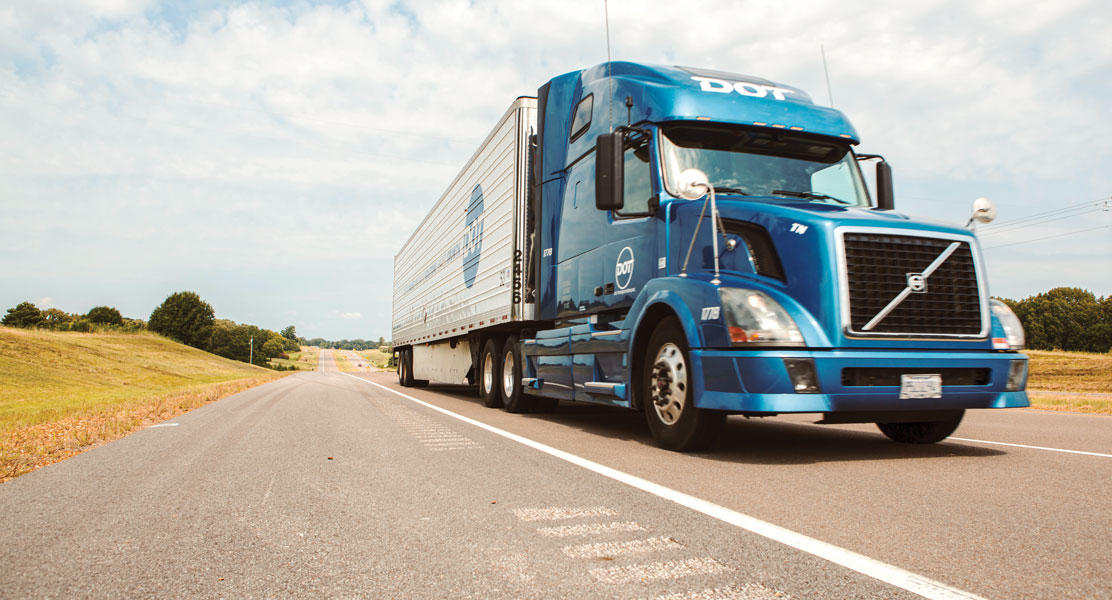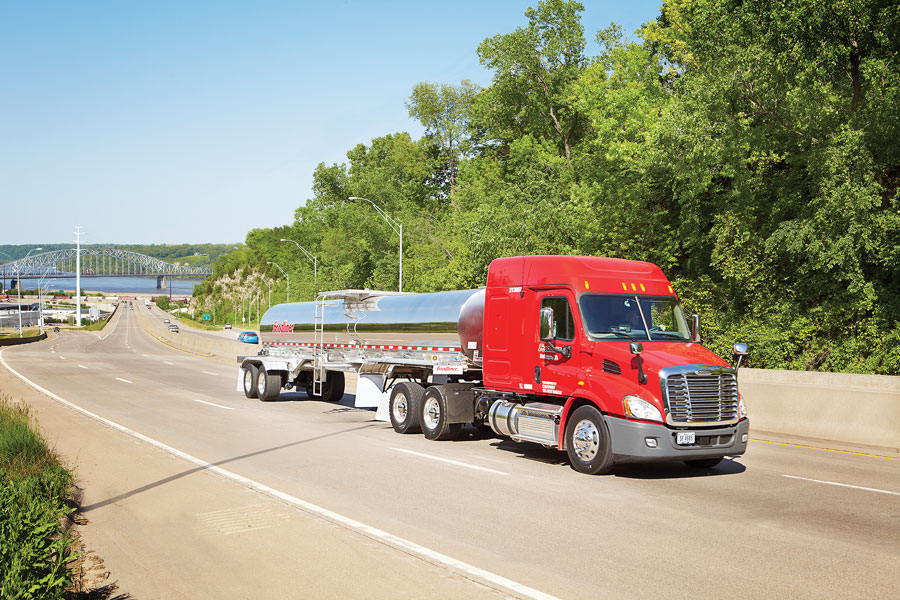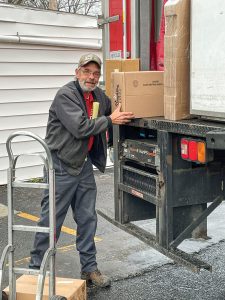
Without a second thought, we reach for an item from a supermarket freezer or grab something from a foodbank shelf. It could be practically anything, from milk to frozen pizzas, fresh vegetables to pancake mix. No matter the item or the grocery, food pantry or convenient store, practically every food item available shares one thing in common – a history of transport by truck.
“There’s nothing in our store that didn’t arrive here on a truck,” explains Dave Armstrong of Farm Fresh, a convenience store in the Williamson County community of Carterville. “I don’t think I really understood it before because it is kind of invisible, but when it starts to break down, we realize how reliant we are on these folks that move items from one place to another.”
A recent report from the American Trucking Association indicated that nearly three-fourths of all consumer goods including food are moved by truck. In some places, such as rural areas of Illinois, the figure is much higher.
“You can look at all of the towns in Illinois – not every community has an airport, not every town has a river port and many communities do not have a railway, but what you will find is that every town in our state has a road and where there is a road, there are trucks,” explains Matt Hart, executive director of the Illinois Trucking Association, a not-for-profit trade group representing 20,000 trucking companies in the state and more than 320,000 drivers and others in the trucking industry.
Trucks do more than deliver final products to food banks and grocers. It is transportation which connects all stages of the food supply chain. When the trucks don’t run, the impact can be immense.
“Without shipments in our case, the first things I think of is we miss sales and consumers discover the things they think should be on the shelves aren’t there,” Armstrong says. “Bottom line, if the trucks don’t show up, we don’t have inventory and you don’t have food.”
An industry study revealed that just one truck was available for every 12 loads needing to be shipped. The primary reason for the backlog is a shortage of truck drivers.
“The biggest issue facing our industry right now is finding quality professional drivers. There is a huge shortage of truck drivers,” Hart continues, “Driving a truck is a very important job, but it’s not a job for everybody. It takes a lot of skill to navigate a vehicle that’s 65 feet long and 80,000 pounds.”
The truck driving population is growing older and the pool of available drivers is shrinking.

Jeff Wesenberg, executive vice president of Foodliner, a Dubuque, Iowa-based trucking company which specializes in transporting food ingredients to commercial bakeries and food processors, agrees that keeping trucks moving takes drivers.
“Finding high-quality drivers is one of the largest challenges we face,” he says. Foodliner operates more than 100 trucks throughout Illinois.
Dot Transportation, Inc., an affiliate of Dot Foods, Mt. Sterling, is the largest food industry redistributor in North America. Paul Mugerditchian, president of Dot Transportation, points out that Dot drivers, along with all other industry drivers that spend time on the road, sacrifice for their families with time away from home.
“Home is where most of America has spent more time recently,” Mugerditchian says. “This is opposite for drivers and life is tougher on the road for drivers nowadays. Everyone is cautious, as we should be, but that can give drivers the perception they are outcasts. Drivers perform an invaluable service, and we should be grateful for their sacrifice.”
Almost everything we consume gets delivered on a truck. That is true whether you are buying from a store or have it delivered to your home. With more than 1,500 Dot Transportation trucks on the road, it is a challenge to have enough drivers.
The Illinois Trucking Association’s Hart agrees.

southern Illinois business. Drivers like Floyd are vital to keeping
restaurants, grocery stores and foodbanks fully stocked.
“There’s no doubt that the current truck driver shortage is impacting our ability to provide food. We must have drivers to get the food from the fields to the elevators, from the elevators to the processors and from the processors to the retailers and consumers. To continue to deliver the food that people need and want, we’re going to need more drivers,” he says.
Wesenberg says recent upswings in consumer’s buying has also impacted the ability to find drivers.
“Everybody’s been cyber-buying (ordering items online) and it is taking more trucks to deliver those goods. That’s drawing from other sectors of the driving market,” he says, emphasizing that more shipments of all kinds stretch food transportation even more.
Fewer drivers means less food being transported to restaurants and store shelves. The problem can be even worse for foodbanks that rely on frequent deliveries to keep their pantries and shelves fully stocked, often with perishable items.
“A supply chain problem means we can’t get food,” explains Steve Ericson, executive director of Feed Illinois, an association of food banks throughout the state. “Food could spoil and it’s going to go to waste, which is tragic when we have this growing need in many of our communities. It’s very frustrating.”
The problem is not lost on elected officials. Before running for public office, U.S. Congressman Mike Bost (R-Murphysboro) managed his family’s trucking business. Today, he serves on the House of Representatives’ Committee on Transportation and Infrastructure, so his perspective on the issue is unique.
“It’s amazing to hear people complain about trucks, but it is important to understand that these are vital assets we are talking about. We need trucks to get these items moved all throughout the food chain anywhere from the field to the table,” Bost says.
Armstrong says he will never complain about trucks. He has seen firsthand their value.
“I know now that they are absolutely critical,” he says. “I know we are very reliant on the people in trucking and my hat is off to those who do it.”








